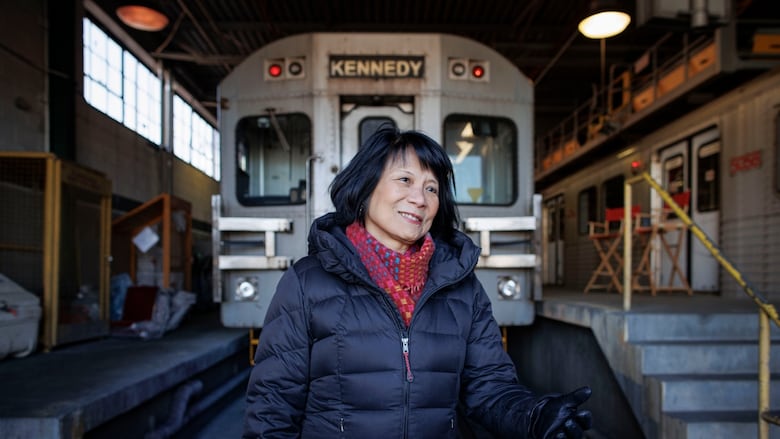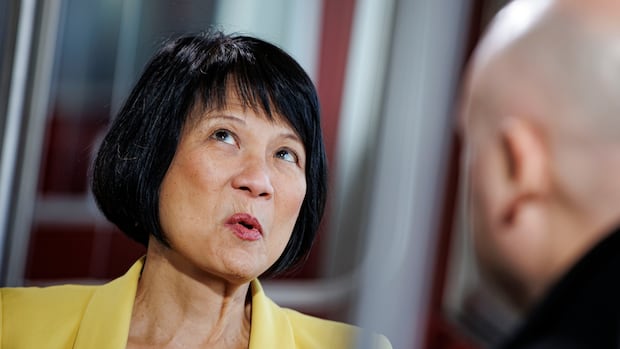Toronto has to 'do our share' to fix billion-dollar deficit with property tax increases, new fees: Chow
Mayor says tough decisions coming in city budget process launching next month

Toronto may have a new deal with the province for financial relief, but Mayor Olivia Chow says city residents will also need to do their part to battle the $1.5-billion shortfall — and that will mean property tax increases and new fees in 2024.
Chow made the comments to CBC Toronto in a wide-ranging year end interview.
The new mayor and Premier Doug Ford announced an agreement last month that will see the province provide billions of dollars in aid and upload the Gardiner Expressway and Don Valley Parkway. But Chow says the city has to be willing to show it will make sacrifices as well to fix the city's structural deficit.
"We'll do our share," she said. "You have to prove and show that you're willing to pay for things first or else you wouldn't get other people to come on."
As examples, Chow points to work she and city council did in the fall to increase the rate of the vacant home tax and create new tiers for high-end homes on the land transfer tax.
City staff are also studying several new taxes, including a commercial parking lot levy and a tax that would target foreign home buyers. They're expected to report back to council in 2024.
Chow is candid when asked if the city will need more revenue tools.
"Yes," she said. "There will be."
Questions remain about federal commitment
But questions remain about the new deal between Toronto and province and whether the federal government will come to the table to provide $2.7 billion in funding requested by the city. In some instances — like with the purchase of new subway trains and shelter supports — cash from Ontario is contingent on matching funds from Ottawa.
It's why Chow choose to conduct her year-end interview in the TTC's Greenwood yard aboard one of the subway trains that needs to be replaced.
"We desperately need investments on both fronts," she said.
That request comes despite some good news from the federal government earlier this week, as Prime Minister Justin Trudeau announced Toronto would receive nearly half a billion dollars to help speed up housing construction in the city.
Chow coy on property tax hike
The new mayor has been dogged by questions about what property tax rates will look like under her leadership. Her go-to line since the spring byelection has been that a "modest" increase is in order.
Chow wasn't ready to give an answer during the interview, but said the rate will be decided soon. It will depend on the federal response to the request for more funding, but also a consultation process with city residents that started in November.
"The budget committee is going to take a look at it and say, 'Maybe that's too high or too low,'" she said.
"Maybe we need to add more and subtract here. And then at the end of January, they're going to present to me the budget. And then as the mayor, I will take all of that into consideration and present a budget on Feb. 1."
Chow said her focus will be on restoring TTC services which have been cut during the pandemic. She said she also wants to shore up basic services across Toronto.
"I have noticed …that a lot of regular bread and butter kind of services, potholes, washrooms, garbage bins, all of those things that are really fundamental to the quality of life of local residents are not done as well as they can be," she said. "And my commitment is really enhancing those kinds of services because they've been cut."
Chow downplays Toronto Science Centre idea
Part of the city's agreement with the province on the new deal means dropping the fight over the future of Ontario Place and, by extension, the Ontario Science Centre.
Chow says she is not responsible for the province's move on the waterfront park and believes it should remain a public space. That fight is now in the hands of opposition leaders at Queen's Park, she said.
"I'm a municipal government leader and the City of Toronto remains on the books to be very concerned about Ontario Place and the Science Centre," she said.

The city owns the land that is home to the Ontario Science Centre and some city politicians have mused about creating a Toronto Science Centre in that space when the province moves it to Ontario Place.
But Chow downplayed the idea.
"We don't have the financial means to run a science program," she said. "That's not our mandate. We could assist in bringing people together and look at some local programming."
Moving too fast? Mayor says no
Chow also poured cold water on critics suggesting she has moved too quickly on a trio of recent decisions that bypassed the city's normal consultation process.
Those critics have said that in her push to cap ride-sharing and the bids to rename Yonge-Dundas Square and the football stadium in Centennial Park after former mayor Rob Ford, Chow and her council allies circumvented the normal process to receive public feedback.
Asked if this was becoming a pattern, Chow said no.
"We invite people for meaningful consultation," she said, pointing to her advance budget consultations in November.
"The Dundas discussion has been around for two years," she added. "There have been 19 meetings. My goodness, you know, at some point, you can process and process everything, but you need to make a decision. If not, then we just go around and around and around. We need to make a decision."


